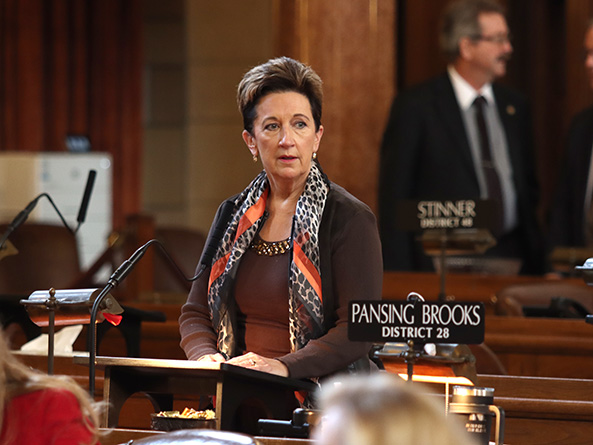Cloture attempt fails on changes to state truancy law
A bill that would provide additional resources to students with excessive school absences stalled on select file Jan. 31 after a failed cloture motion.

In 2010, the Legislature passed a bill requiring school districts to report truancy cases to a county attorney when a student has been absent at least 20 days in a year, whether the absences are excused or unexcused.
Under LB568, introduced last session by Lincoln Sen. Patty Pansing Brooks, excessive absenteeism would no longer be an independent basis for a juvenile court action. It could, however, still be considered as a factor in other juvenile cases.
The bill also would replace official references to “truancy” with “excessive absenteeism.”
Pansing Brooks offered an amendment that would ensure that county attorneys exhaust all diversion options before relying on the juvenile justice system, while maintaining excessive absenteeism as a status offense — conduct that would not be a crime if committed by an adult.
She said the county attorneys’ association expressed their support for the bill with the amendment after opposing it last session.
“It’s an important step forward to ensure our kids receive appropriate interventions to help keep them in school and out of our juvenile justice system,” Pansing Brooks said. “A lot of these kids have problems at home and need help … let’s give them the help that they need and provide the resources to the counties that they need for these diversion programs.”
Under the bill as amended during general file debate in 2021, juveniles could be referred to pretrial diversion programs and receive services to address their needs or those of their families. The bill would create a new position within the Nebraska Crime Commission charged with developing regulations for diversion programs and assisting in the review of applications for grant funding.
LB586 also would expand eligibility for grant funding to programs that serve families of juveniles who are experiencing excessive absenteeism, and allow aid not distributed to counties to be used for statewide programs to benefit individual counties and the state’s Indian tribes.
The amended bill would increase funding to the Community-based Juvenile Services Aid Program from $5 million to $8 million in fiscal year 2023-24 and each subsequent fiscal year to fund those expanded diversion services.
Pansing Brooks said there are still a few counties in Nebraska that do not offer diversion, and that the bill would allow those counties to establish diversion programs.
Norfolk Sen. Michael Flood opposed the bill during select file debate Jan. 27. He said LB568 would go too far in its attempt to keep juvenile offenders out of the criminal justice system and would remove the discretion of county attorneys who are elected to ensure public safety.
“We have a justice system that needs to be able to be used by the prosecutors. If you don’t want to let prosecutors have access to the justice system, or if you want to put [up] … these statutory barriers to get a juvenile into the juvenile court system, then why don’t we call our county attorneys social workers?” Flood said.
Sen. Suzanne Geist of Lincoln also opposed LB568, saying the real problem for many juveniles is a lack of consequences and appropriate sanctions for their behavior. The pendulum has swung too far in favor of leniency, she said, and the juvenile justice system is out of balance.
“One of the best things that government can do is mimic a good parent,” Geist said. “Using swift, certain and proportionate sanctions is the best way to get through to an individual who’s [engaged] in bad behavior.”
Omaha Sen. Terrell McKinney supported the bill and Pansing Brooks’ amendment, saying lawmakers should be steering juveniles away from the justice system rather than into it.
“We need to pass bills to help families,” McKinney said. “A lot of the individuals that I went to school with that were truant were dealing with issues in the home — not having water, not having heat, not having proper transportation, not having food — that’s why most of these kids are truant; we’re not meeting their needs as a state.”
Also in support was Omaha Sen. John Cavanaugh, who said Nebraska needs consistency in how it applies the law across the state within the juvenile justice system. It’s politically popular to appear “tough on crime” he said, but lawmakers instead should focus on keeping young people in school and out of the criminal justice system.
“A lot of children, once they get into the system, continue in the system and it is self-perpetuating,” Cavanaugh said. “Our job is not to do popular, it is to do right.”
After debate spanning several days, Pansing Brooks withdrew her amendment Jan. 31 in an attempt to garner support for the measure and said she would back an alternative amendment offered by North Platte Sen. Mike Groene to remove all provisions of the bill except the additional funding to counties. Groene responded that senators lacked the time to fully consider his proposal.
“I brought this amendment to make a bad bill better if possible. But we’re so late in the game, we don’t have enough time to debate this amendment,” he said.
Pansing Brooks then offered a motion to invoke cloture, which ends debate and forces a vote on the bill and any pending amendments. The motion failed on a 26-18 vote. Thirty-three votes were needed.
A failed cloture motion results in debate on a proposal ceasing for the day. LB568 is unlikely to be placed on the agenda again this session.


